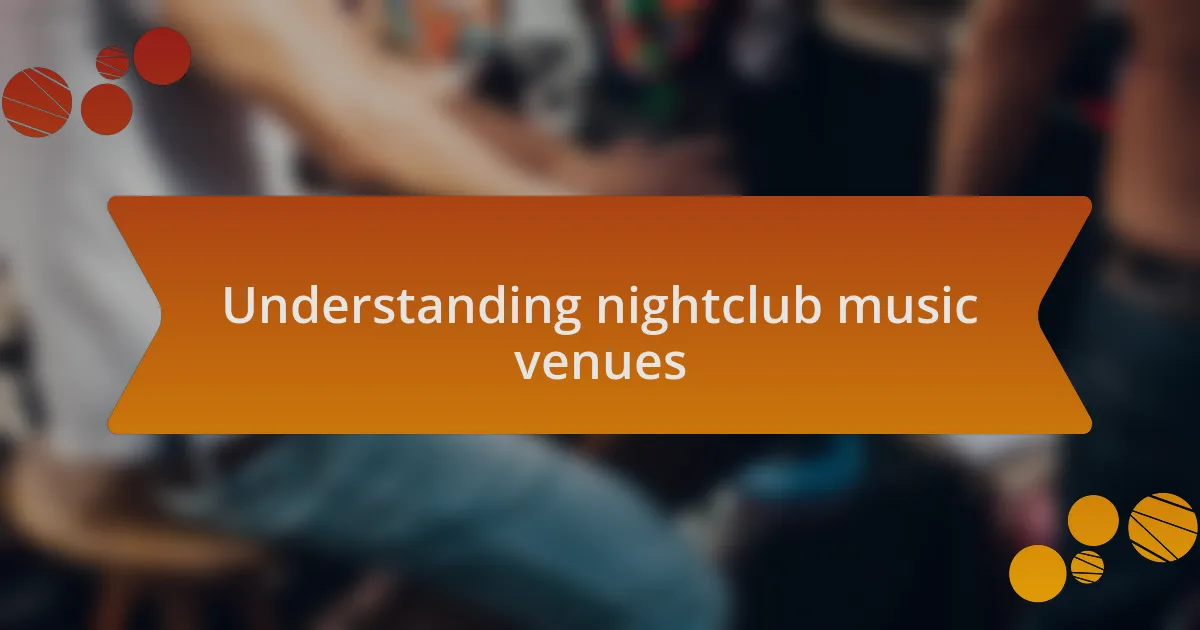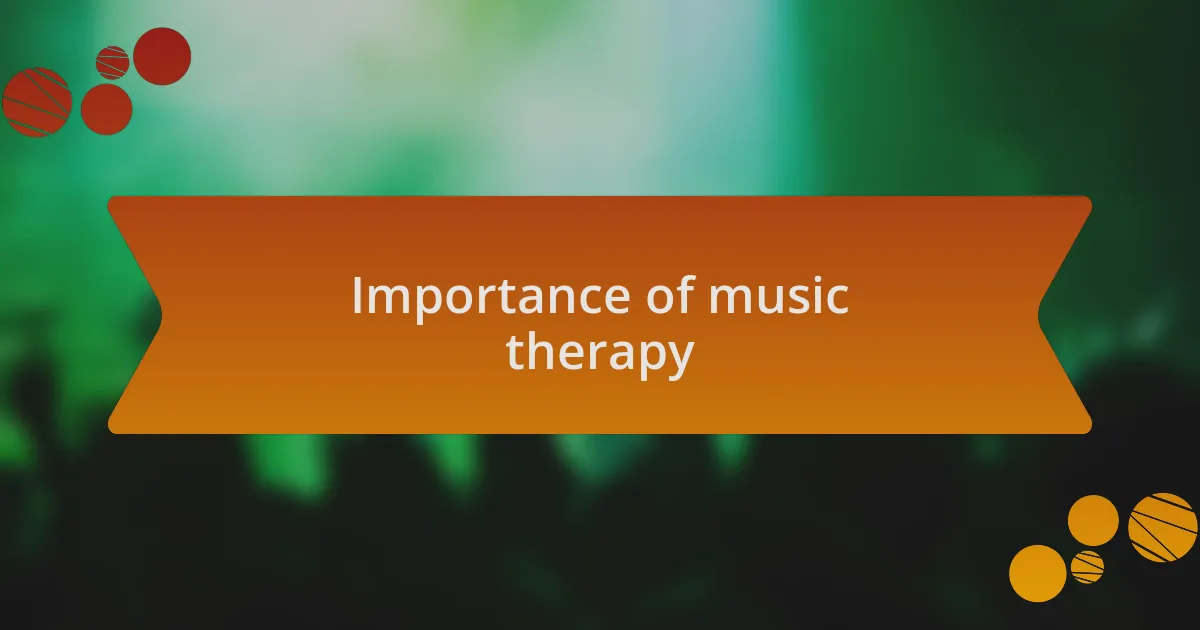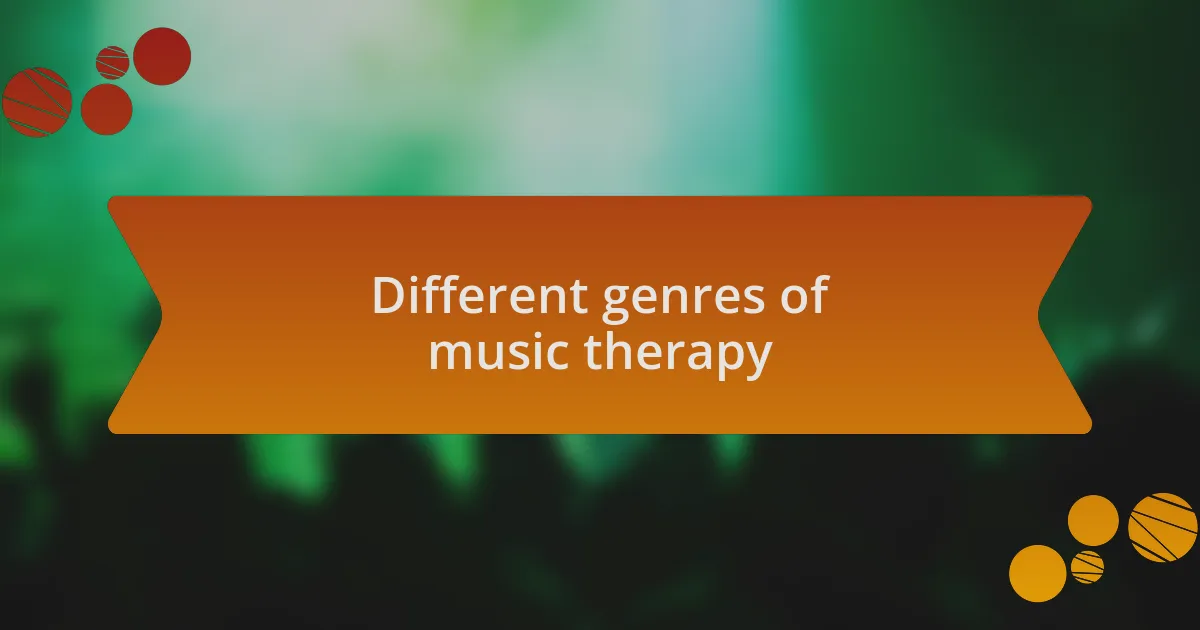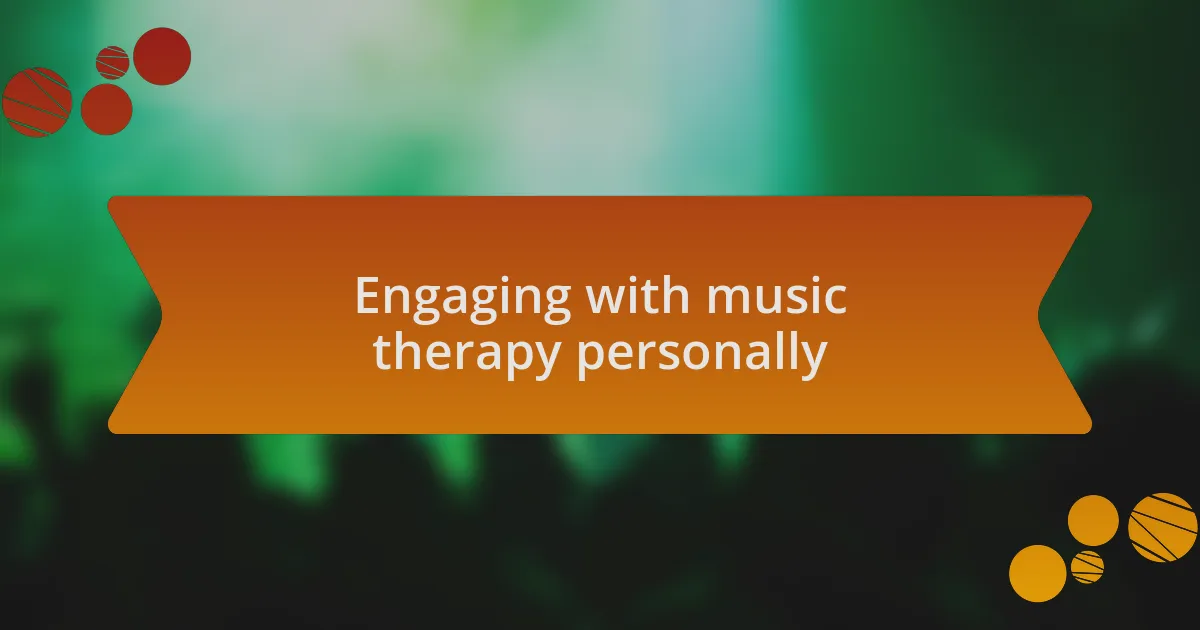Key takeaways:
- Nightclub music venues are dynamic spaces that shape emotional experiences and foster connections through diverse music genres.
- Music therapy serves as a powerful tool for emotional processing and community bonding, providing therapeutic benefits beyond mere enjoyment.
- Different music genres, such as classical, rhythm-based, and pop, facilitate unique emotional exploration and healing pathways.
- Personal engagement with music therapy, through soundscapes and songwriting, can lead to profound emotional clarity and healing moments.

Understanding nightclub music venues
Nightclub music venues are more than simply spaces where DJs spin records; they are vibrant ecosystems of sound and emotion. I remember stepping into a dimly lit venue for the first time, the beat hitting me in the chest, instantly making me feel part of something larger. Isn’t it fascinating how certain genres resonate differently within these walls, transforming the atmosphere and the crowd’s energy?
These venues often reflect the pulse of the local music scene, shaping cultural conversations and experiences. Picture a night filled with pulsating electronic beats, where strangers become friends on the dance floor, united by rhythm. I’ve found that each genre can evoke a unique response—house music invites a freeing spirit, while techno often immerses you in introspection. What is it about these sonic landscapes that keep us coming back for more?
The layout and design of nightlife spaces also play a crucial role in the experience. I once attended an underground rave with unexpected corners and hidden rooms that added layers of discovery to the night. How do these carefully crafted environments influence our emotional connection to the music? It’s clear to me that every detail counts in creating a memorable and immersive experience for everyone involved.

Importance of music therapy
The role of music therapy in our lives cannot be overstated. I remember a friend who struggled with anxiety; attending a live jazz performance transformed her mood completely. It’s fascinating how different music genres can provide therapeutic benefits, helping people process emotions in ways that words sometimes cannot express.
Music therapy acts as a bridge connecting individuals to their feelings and experiences. I once witnessed a group session where participants shared their stories through the rhythm of their favorite songs, creating a sense of community. How powerful is it to see strangers bond over shared melodies, finding comfort in each other’s vulnerabilities?
The healing effects of music therapy extend far beyond mere enjoyment. During a particularly tough period in my life, I turned to ambient music to help me reflect and heal. It’s incredible how selecting certain tracks can evoke memories or feelings that guide us towards understanding and healing. What if we embraced music therapy more widely, using sound to nurture mental health?

Different genres of music therapy
Different genres of music therapy offer unique avenues for emotional exploration. For instance, I’ve found that classical music often evokes a sense of calm and introspection, which can be particularly useful during moments of stress. Have you ever noticed how certain compositions can transport you to a different state of mind? It’s remarkable to consider how something as structured as classical pieces can encourage introspection and healing.
On the other hand, I remember joining a group focused on rhythm-based therapy, where drumming played a central role. The pulsating beats invigorated my spirit and connected us as a group. It’s like the energy flowed between us, reinforcing a sense of unity and belonging that is often hard to find in everyday life. Isn’t it fascinating how a simple rhythm can create such profound connections?
Then there’s the genre of pop music, which seems to resonate deeply with younger individuals seeking empowerment and identity. I’ve witnessed young adults using pop songs to articulate their feelings, turning the lyrics into a kind of narrative for their lives. This ability to relate to lyrics is essential, as it validates their experiences. How many times have you sung along to a song, feeling like the artist was telling your own story? That connection fosters healing in such relatable ways.

Engaging with music therapy personally
The first time I tried music therapy, I was surprised by how deeply it resonated with my emotions. I remember a session where we explored soundscapes, allowing nature sounds to transport me to serene places. Have you ever closed your eyes and let music guide you? It’s incredible how such experiences can help us reconnect with ourselves.
In another instance, I participated in a songwriting workshop as part of my therapy. I found that composing lyrics was liberating; it became a canvas for my thoughts and feelings. It was almost like a dialogue with myself. Isn’t it interesting how putting pen to paper can transform inner chaos into clarity? Those moments of creation felt like personal breakthroughs.
One genre that particularly struck a chord with me was jazz. I’ve often felt that the spontaneity and improvisation in jazz music reflect the unpredictability of life itself. During a session, I found myself moving with the rhythms, encouraged to express emotions that had long been tucked away. Have you ever felt your body sway as if the music was speaking directly to it? That freedom in expression through jazz was not just uplifting; it became a pathway for healing.